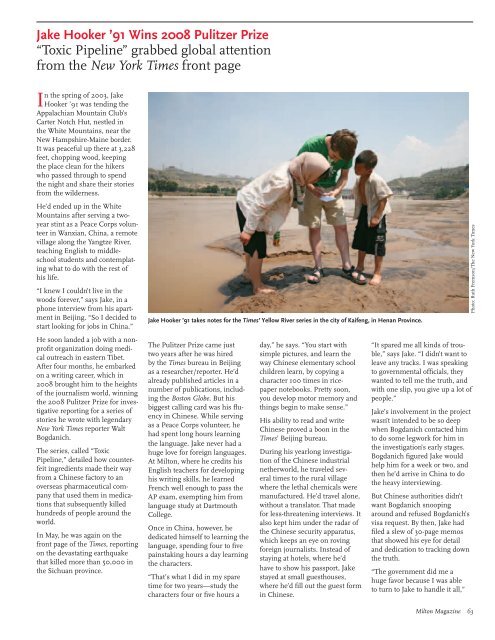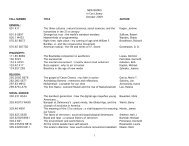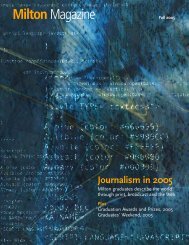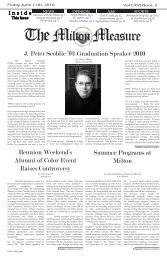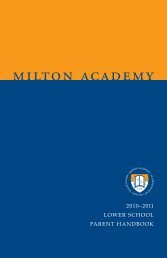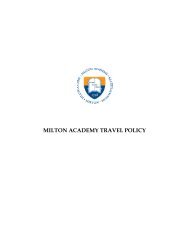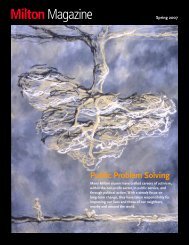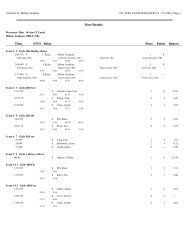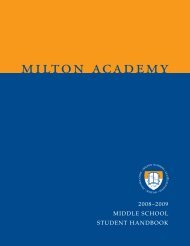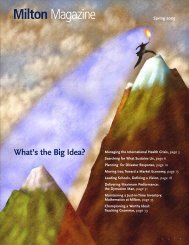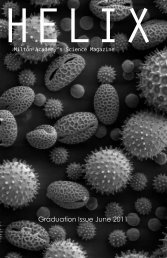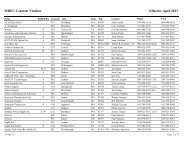Milton Magazine - Milton Academy
Milton Magazine - Milton Academy
Milton Magazine - Milton Academy
- No tags were found...
You also want an ePaper? Increase the reach of your titles
YUMPU automatically turns print PDFs into web optimized ePapers that Google loves.
Jake Hooker ’91 Wins 2008 Pulitzer Prize“Toxic Pipeline” grabbed global attentionfrom the New York Times front pageIn the spring of 2003, JakeHooker ’91 was tending theAppalachian Mountain Club’sCarter Notch Hut, nestled inthe White Mountains, near theNew Hampshire-Maine border.It was peaceful up there at 3,228feet, chopping wood, keepingthe place clean for the hikerswho passed through to spendthe night and share their storiesfrom the wilderness.He’d ended up in the WhiteMountains after serving a twoyearstint as a Peace Corps volunteerin Wanxian, China, a remotevillage along the Yangtze River,teaching English to middleschoolstudents and contemplatingwhat to do with the rest ofhis life.“I knew I couldn’t live in thewoods forever,” says Jake, in aphone interview from his apartmentin Beijing. “So I decided tostart looking for jobs in China.”He soon landed a job with a nonprofitorganization doing medicaloutreach in eastern Tibet.After four months, he embarkedon a writing career, which in2008 brought him to the heightsof the journalism world, winningthe 2008 Pulitzer Prize for investigativereporting for a series ofstories he wrote with legendaryNew York Times reporter WaltBogdanich.The series, called “ToxicPipeline,” detailed how counterfeitingredients made their wayfrom a Chinese factory to anoverseas pharmaceutical companythat used them in medicationsthat subsequently killedhundreds of people around theworld.In May, he was again on thefront page of the Times, reportingon the devastating earthquakethat killed more than 50,000 inthe Sichuan province.Jake Hooker ’91 takes notes for the Times’ Yellow River series in the city of Kaifeng, in Henan Province.The Pulitzer Prize came justtwo years after he was hiredby the Times bureau in Beijingas a researcher/reporter. He’dalready published articles in anumber of publications, includingthe Boston Globe. But hisbiggest calling card was his fluencyin Chinese. While servingas a Peace Corps volunteer, hehad spent long hours learningthe language. Jake never had ahuge love for foreign languages.At <strong>Milton</strong>, where he credits hisEnglish teachers for developinghis writing skills, he learnedFrench well enough to pass theAP exam, exempting him fromlanguage study at DartmouthCollege.Once in China, however, hededicated himself to learning thelanguage, spending four to fivepainstaking hours a day learningthe characters.“That’s what I did in my sparetime for two years—study thecharacters four or five hours aday,” he says. “You start withsimple pictures, and learn theway Chinese elementary schoolchildren learn, by copying acharacter 100 times in ricepapernotebooks. Pretty soon,you develop motor memory andthings begin to make sense.”His ability to read and writeChinese proved a boon in theTimes’ Beijing bureau.During his yearlong investigationof the Chinese industrialnetherworld, he traveled severaltimes to the rural villagewhere the lethal chemicals weremanufactured. He’d travel alone,without a translator. That madefor less-threatening interviews. Italso kept him under the radar ofthe Chinese security apparatus,which keeps an eye on rovingforeign journalists. Instead ofstaying at hotels, where he’dhave to show his passport, Jakestayed at small guesthouses,where he’d fill out the guest formin Chinese.Photo: Ruth Fremson/The New York Times“It spared me all kinds of trouble,”says Jake. “I didn’t want toleave any tracks. I was speakingto governmental officials, theywanted to tell me the truth, andwith one slip, you give up a lot ofpeople.”Jake’s involvement in the projectwasn’t intended to be so deepwhen Bogdanich contacted himto do some legwork for him inthe investigation’s early stages.Bogdanich figured Jake wouldhelp him for a week or two, andthen he’d arrive in China to dothe heavy interviewing.But Chinese authorities didn’twant Bogdanich snoopingaround and refused Bogdanich’svisa request. By then, Jake hadfiled a slew of 30-page memosthat showed his eye for detailand dedication to tracking downthe truth.“The government did me ahuge favor because I was ableto turn to Jake to handle it all,”<strong>Milton</strong> <strong>Magazine</strong> 63


